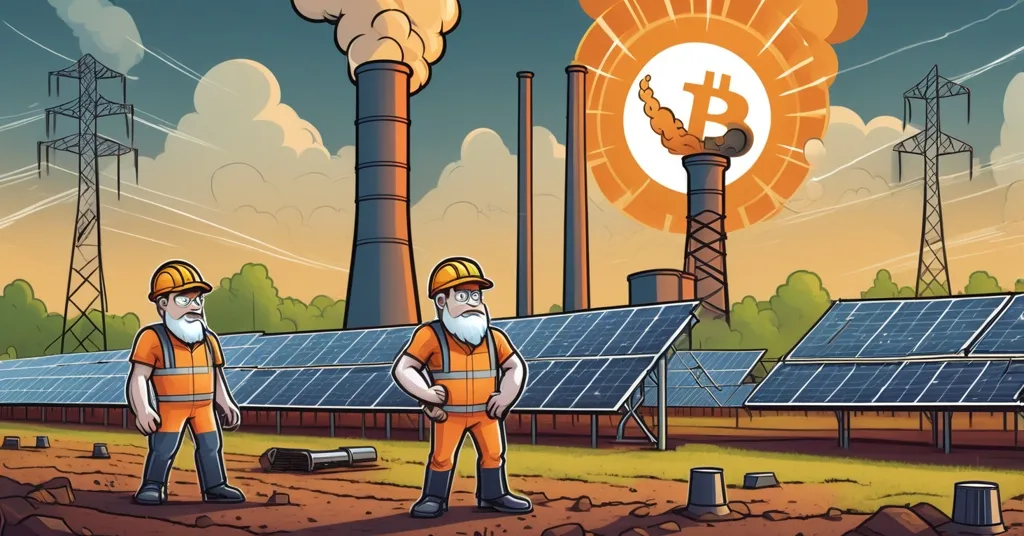Bitcoin Mining Drives U.S. Energy Expansion: Boosting Renewables, Raising Environmental Concerns

Bitcoin Mining Fuels Expansion of U.S. Energy Infrastructure
– Bitcoin mining drives new energy projects
– Boosts renewable energy investment
– Raises environmental concerns
Bitcoin mining, the process of validating transactions and adding them to the blockchain, is not just a digital gold rush; it’s a catalyst for a green energy revolution in the U.S. The demand for electricity from mining operations is driving significant changes in the energy sector, particularly in renewable energy.
Impact on Renewable Energy
The surge in mining activities has led to increased investment in solar and wind energy sources. Mining operations, requiring vast amounts of electricity, are turning to renewables to meet their energy needs sustainably. For instance, a mining operation in Texas has partnered with a local solar farm to power its activities, reducing its carbon footprint and driving innovation in green energy technologies. This shift is not only helping to reduce the environmental impact of mining but also boosting the renewable energy sector.
Environmental Concerns
However, the environmental toll of bitcoin mining is a dark cloud hanging over its green energy aspirations. Critics argue that the high energy consumption associated with mining contributes to environmental degradation. In regions like New York, where mining operations have been linked to increased carbon emissions, the debate over the sustainability of mining continues. Some are calling for more stringent regulations to mitigate its environmental footprint.
Bitcoin’s proof-of-work consensus mechanism, which requires substantial computational power and electricity, contrasts with proof-of-stake mechanisms used by other cryptocurrencies like Ethereum, which consume significantly less energy. Despite the move towards renewables, the UN study highlights that Bitcoin mining still heavily relies on fossil fuels, with 67% of electricity sourced from fossil fuels in 2020-2021. This reliance raises significant environmental concerns beyond just carbon emissions, including water and land footprints.
Grid Stability
Bitcoin miners are turning into the unlikely heroes of the renewable energy saga, one kilowatt at a time. By utilizing excess or stranded energy—energy that is produced but not used due to its remote location or lack of infrastructure to transport it—mining operations can help stabilize the grid. This practice can lead to a more efficient and resilient energy system, as seen in a project in Colorado where miners are using excess hydroelectric power to stabilize the local grid.
The U.S. Energy Information Administration (EIA) confirms that miners participate in demand-response programs, such as the Large Flexible Load (LFL) program in Texas, which helps stabilize the grid by curtailing use during peak demand. This participation underscores the potential for mining to contribute positively to energy infrastructure.
Economic Benefits
The growth in mining-related energy projects is also bringing economic benefits. New infrastructure projects are creating jobs and stimulating economic activity in certain areas. In Wyoming, a new mining facility has created over 100 jobs and boosted the local economy, providing a tangible example of the positive impact of bitcoin mining.
However, it’s important to consider the broader societal implications. The UN study also points out the inequity and injustice aspects of Bitcoin mining’s environmental impact, which can disproportionately affect certain communities. Balancing economic growth with social justice remains a critical challenge.
Potential Regulatory Changes
As bitcoin mining continues to expand, it may prompt regulatory changes. The impact of mining on energy consumption and the environment is under scrutiny, and policymakers may need to address these issues to balance the benefits and drawbacks of this burgeoning industry. Some states are already considering legislation to regulate mining operations and their environmental impact.
The decentralized nature of Bitcoin complicates national regulations, as seen with China’s mining ban leading to a shift rather than a reduction in global mining activity. Experts suggest that a global pricing mechanism for environmental externalities could mitigate Bitcoin’s environmental impact, highlighting the need for international cooperation.
Counterpoints and Future Outlook
While Bitcoin mining drives innovation in renewable energy and grid stability, it’s crucial to acknowledge the significant environmental and societal challenges it poses. The industry must address these issues head-on to ensure sustainable growth. The UN report recommends investing in more energy-efficient digital currencies as a potential future direction, suggesting that the crypto space may need to evolve beyond Bitcoin to mitigate environmental impacts.
The relocation of mining operations from China to the U.S. and the use of surplus energy in regions like Sichuan and Texas illustrate the industry’s adaptability. However, Bitcoin’s reliance on fossil fuels remains a critical issue that needs to be addressed. As the industry evolves, it will be essential to find a balance that maximizes the benefits of bitcoin mining while minimizing its environmental impact.
Key Questions and Takeaways:
- What is driving the development of new energy infrastructure projects in the U.S.?
The demand for electricity from bitcoin mining operations.
- How does bitcoin mining contribute to the growth of renewable energy?
By increasing investment in solar and wind energy to meet mining’s high electricity demands.
- What are the environmental concerns associated with bitcoin mining?
High energy consumption, reliance on fossil fuels, and potential environmental degradation, including carbon emissions, water, and land footprints.
- How does bitcoin mining impact grid stability?
By utilizing excess or stranded energy, helping to stabilize the grid through participation in demand-response programs.
- What are the economic benefits of mining-related energy projects?
Creation of jobs and stimulation of local economies, though this must be balanced with broader societal implications.
- What potential regulatory changes might arise from the impact of bitcoin mining on energy consumption?
Possible new regulations to address environmental concerns and energy consumption, potentially requiring international cooperation.



